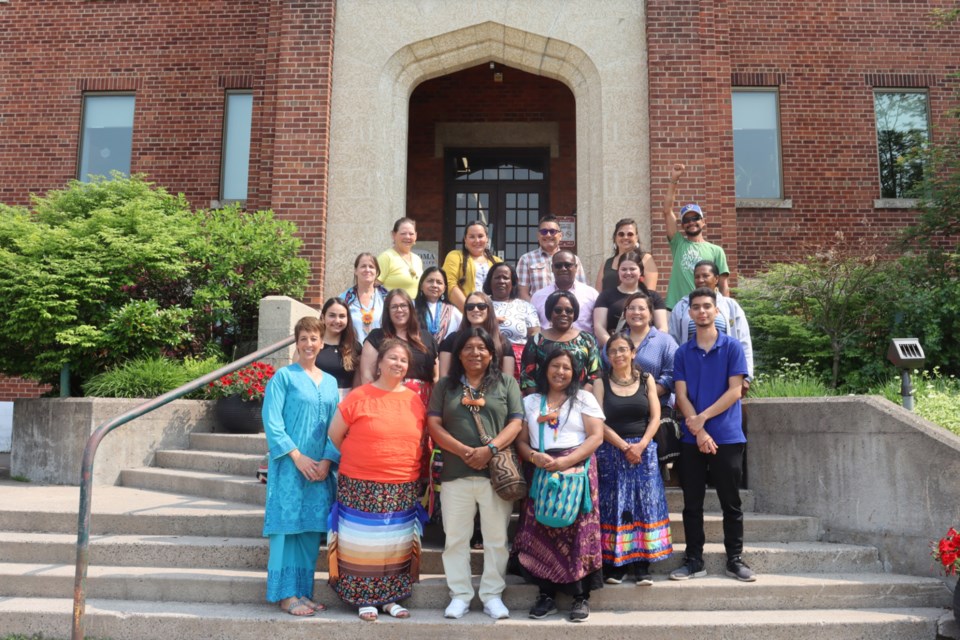Algoma University had some special visitors recently as a delegation of Indigenous and Black-Afrodescendant leaders from Colombia was in Sault Ste. Marie.
The group made the trip as part of an effort to deepen commitments to decolonization, diplomacy between nations and diverse peoples, and to supporting intercultural approaches to education and peace-building.
Further details on the visit can be found in the following release from Algoma University:
Algoma University, in collaboration with Shingwauk Kinoomaage Gamig (SKG), NORDIK Institute, the Robinson- Huron Treaty Chiefs, the Institute for Peoples, Territories, and Pedagogies for Peace, the Mukwa Waakaa’igan project, the Faculty of Cross-Cultural Studies, the Office of Equity, Diversity, and Inclusion (EDI), the African Caribbean Canadian Association of Northern Ontario (ACCANO), and the Indigenous Women Anti-Violence Task Force (IWAVTF) hosted a delegation of Indigenous and Black-Afrodescendant leaders from Colombia to Baawaating/Sault Ste. Marie. The delegation was part of a collaborative effort to deepen commitments to decolonization, diplomacy between Nations and diverse peoples, and to supporting intercultural approaches to education and peace-building. The visit took place in partnership with the University of British Columbia, the Global Center for Pluralism, the University of Toronto, and the Canadian Association of Latin American and Caribbean Studies (CALACS).
The visit made visible Algoma University’s commitments to EDI, cross-cultural and decolonizing education and learning, reflective of the strategic directions of the university as well as the emerging global Institute for Peoples, Territories and Pedagogies for Peace.
Algoma University, along with partners, stepped onto the international stage in conversations about decolonizing education, the Colombian peace dialogues underway, the parallels between Truth Commissions and reconciliation efforts in Canada and Colombia, as well as grassroots strategies to support survivors of residential schools, to search for the remains of the missing, and to confront violence against Indigenous women and girls. The Indigenous Women’s Anti-Violence task force organized a welcome breakfast on June 5, while Algoma University hosted a community dinner and panel discussion that evening called “Decolonial Education, Indigenous and Afro-diasporic Perspectives on Peace and Environmental Justice”.
There were eight visitors in the delegation from Colombia, including Afro-Colombian social leader and former Truth Commissioner Leyner Palacios Asprilla who served in the Colombian Commission for the Clarification of Truth, Co-Existence and Non-Repetition and vocal survivor of the Bojaya massacre; as well as Magistrate and Arhuaca Indigenous leader, Belkis Florentina Izquierdo Torres of the Special Jurisdiction for Peace. Both spoke eloquently about Black and Indigenous peoples' perspectives on peace-building and truth-telling as well as the legal battle for the protection and recognition of the rights of nature and the important role of higher education in moving these efforts forward.
On June 6, after a beautiful welcome ceremony organized by Chief Dean Sayers, pipe carriers and members of Robinson Huron Treaty communities, the delegation also exchanged with the Children of Shingwauk site search team at the Shingwauk cemetery and at the offices of Shingwauk Kinoomaage Gamig (SKG). They shared experiences regarding the impacts of violence and their respective communities as well as the cultural-spiritual approaches taken to identify sites of unmarked graves and the remains of loved ones.
A dinner and in-depth exchange with members of ACCANO (African Caribbean Canadian Association of Northern Ontario), the Mukwa Waakaa’igaan project and the EDI (Equity, Diversity, Inclusion) program at Algoma University brought a focus on Black-Afrodiasporic perspectives as well as Indigenous-Black relationships and allyship.
Clemencia Herrera, Coordinator for Education at the National Indigenous Organization of Colombia (ONIC) shared personal experiences as a survivor of residential school in the Amazon region of Colombia, as well as her tireless efforts in the area of higher education. This included a panel presentation and spotlight on the ONIC’s proposal for an Indigenous university, Kinsia Yetarauai in Colombia for which Algoma University has established an agreement to support.
A space for exchange was also established with the Faculty of Cross-Cultural Studies, the newest faculty at Algoma University, as well as members of various departments in other faculties interested in Indigenous, decolonizing education. Commitments and strategies for follow-up were established with the President of Algoma University, Vice President Academic and Research, Vice President Niiyaagaaniid Anishinaabe Initiatives, the Director of Mukwa Waakaa’igaan, the Chair of the Faculty of Cross-Cultural Studies, and the Acting Dean of Humanities, Social Sciences and Cross-Cultural Studies, to ensure a longer term and collaborative vision could be implemented going forward. Without a doubt, the visit served to establish a solid foundation for decolonizing learning and education, from which relationships will serve to further the Special Mission of Algoma University and to highlight the important role of Indigenous and Afrodiasporic peoples at a global level.
“This is a time when people who are oriented to the land, who have defended their territories in the face of aggressive, invasive and unwanted development, who strive to address the determinants of colonial and patriarchal violence against women, girls and two-spirit people, who are aware of their historical subjectivities in resistance to the horrors of the Trans-Atlantic slave trade, ongoing imperialist wars and the aftermath of Residential Schools, those who envision a future by thinking about seven generations into the future, must be heard. Our role as university educators is to both listen and to reorient the project of higher learning to one that commits to rethinking society. It is about committing to intercultural learning for peace-building that centres those who have been excluded, to movements for historical reparations, reconciliation and diversity in a most plural and historical sense, and to rethink our relationship with nature in ways that can only serve to illuminate the possibilities for a better future in the face of the many crises - from war, displacement to poverty and climate disaster - that we collectively face as humans on this planet” - Dr. Sheila Gruner, Chair, Faculty of Cross-Cultural Studies.
